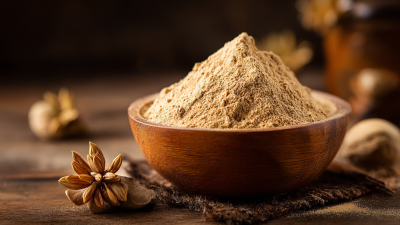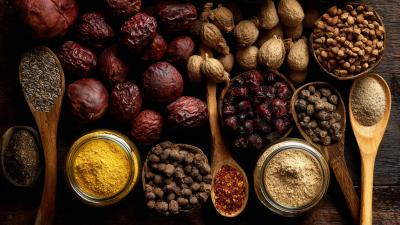
-
Home
-
Products
-
About US
-
FAQ
-
News
-
Tips
-
Contact Us
Leave Your Message
- Phone
- E-mail
- WhatsApp
- WA Business



 As the demand for effective solutions to hair loss and thinning continues to rise, biotin dietary supplements have emerged as a popular choice among consumers seeking to enhance hair growth. Recent studies indicate that approximately 30% of women experience hair thinning by the age of 40, while over 50% of men face similar issues by their mid-50s.
As the demand for effective solutions to hair loss and thinning continues to rise, biotin dietary supplements have emerged as a popular choice among consumers seeking to enhance hair growth. Recent studies indicate that approximately 30% of women experience hair thinning by the age of 40, while over 50% of men face similar issues by their mid-50s.
Biotin, also known as Vitamin B7, plays a crucial role in maintaining healthy hair, skin, and nails. Research suggests that biotin deficiency can lead to hair loss, prompting many individuals to turn to Biotin Dietary Supplement Hair products to support their hair health.
Additionally, the global market for biotin supplements is expected to grow at a CAGR of 5.8%, reflecting an increasing consumer awareness and interest in the benefits of biotin for hair growth. By understanding how to maximize the effectiveness of these supplements through proper diet and lifestyle choices, individuals can take proactive steps toward achieving fuller, healthier hair.
Biotin, also known as vitamin B7, plays a crucial role in supporting hair growth and overall hair health. This water-soluble vitamin is essential for keratin production, which is a key protein that makes up the structure of hair. According to a study published in the journal "Skin Appendage Disorders," biotin deficiency can lead to hair thinning and loss, highlighting the importance of adequate biotin intake for maintaining healthy hair. The recommended daily allowance for biotin is approximately 30 micrograms for adults, but many experts suggest that higher doses may be beneficial for those looking to boost hair growth.
In addition to its influence on hair health, biotin is known to support other bodily functions, including metabolism and the maintenance of skin and nails. A report by the National Institutes of Health indicates that biotin supplementation can significantly improve hair thickness and fullness, particularly in individuals experiencing hair loss. While biotin supplements are widely available, it’s essential to focus on obtaining biotin through a well-rounded diet that includes eggs, nuts, and whole grains to maximize its benefits effectively. Ultimately, combining biotin with a healthy lifestyle can optimize hair growth and contribute to a more vibrant appearance.

Biotin, also known as vitamin B7, is a crucial nutrient that supports hair health. Research indicates that biotin deficiencies can lead to hair thinning and loss. To ensure optimal hair growth, the recommended dosage of biotin supplements typically ranges from 30 to 100 micrograms per day for adults. According to a study published in the Journal of Clinical and Aesthetic Dermatology, participants who took a daily dose of 100 micrograms of biotin experienced significant improvements in hair thickness and overall growth after 90 days of supplementation.
It's important to note that individual needs may vary depending on factors such as age, gender, and overall health. Some professionals recommend higher doses, up to 300 micrograms daily, for those with specific deficiencies or underlying conditions affecting hair growth. The American Academy of Dermatology emphasizes that while biotin supplementation can benefit those lacking adequate levels, it is crucial to consult with a healthcare provider to determine the right dosage tailored to one’s personal health profile. Proper adherence to recommended dosages can maximize the potential benefits of biotin for hair growth, enhancing both volume and strength.
Biotin, a B-vitamin often touted for its potential to enhance hair growth and prevent hair loss, is receiving increasing attention from both consumers and researchers alike. Recent studies have suggested that biotin supplementation, while primarily beneficial for individuals with a deficiency, may also help improve overall hair health. For instance, reports indicate that biotin can potentially serve as a catalyst for stimulating hair follicles and promoting growth, especially in cases of hair thinning.
To maximize the effectiveness of biotin in your hair care routine, consider these tips: First, always consult a healthcare professional before starting any new supplement, especially if experiencing significant hair loss or other concerning symptoms. Secondly, pairing biotin with topical treatments like biotin oil can enhance results, particularly in combating seasonal hair challenges such as those faced during the monsoon. Incorporating nutrients from a balanced diet—rich in vitamins and minerals—can further support the health of your hair, skin, and nails.
Moreover, research has shown that topical formulations, including those containing caffeine and other active ingredients, can complement biotin’s effects by targeting hair loss at multiple levels. Keeping abreast of emerging insights and expert recommendations can guide you toward effective strategies for maintaining vibrant, lush hair.
 Biotin is often touted as a key player in promoting hair growth, but its effectiveness can be significantly enhanced when combined with other essential nutrients. According to a report by the International Journal of Trichology, certain combinations of vitamins and minerals—like zinc, iron, and vitamins A, C, and D—can work synergistically with biotin to improve overall hair health. For instance, zinc is critical for hair tissue growth and repair, while iron is essential for delivering oxygen to hair follicles, fostering a healthy environment for robust hair growth.
Biotin is often touted as a key player in promoting hair growth, but its effectiveness can be significantly enhanced when combined with other essential nutrients. According to a report by the International Journal of Trichology, certain combinations of vitamins and minerals—like zinc, iron, and vitamins A, C, and D—can work synergistically with biotin to improve overall hair health. For instance, zinc is critical for hair tissue growth and repair, while iron is essential for delivering oxygen to hair follicles, fostering a healthy environment for robust hair growth.
Incorporating high-quality protein sources into your diet also plays a crucial role in maintaining healthy hair. While eggs are an excellent source of protein and provide the necessary amino acids for keratin production, consuming them undercooked poses health risks, as highlighted by recent medical insights. The potential risks of eating raw or undercooked eggs include salmonella, which could lead to serious health issues and disrupt your nutritional goals. Therefore, prioritizing fully cooked eggs can ensure you gain their nutritional benefits without compromising your health, ultimately supporting your hair growth journey when combined with the right supplements and a balanced diet.
When choosing the right biotin supplement, it’s essential to consider both the dosage and the quality of the ingredients. Look for supplements that provide a dosage of biotin ranging from 30 to 500 micrograms per serving, as this range has been shown to effectively support hair growth without causing side effects. Additionally, opting for a product that is free from artificial fillers and preservatives can ensure that you are consuming a cleaner supplement that supports overall health.
Another important factor to consider is the form of the biotin supplement. Available in various formats such as capsules, gummies, and tablets, select one that fits your lifestyle and preference. Gummies may be more palatable for some, while others may prefer the convenience of capsules. Also, it's beneficial to look for third-party testing labels on the product, which can provide assurance of purity and potency. Ultimately, investing time in researching the right biotin supplement can significantly enhance your hair growth journey.
| Supplement Type | Biotin Content (mg) | Additional Ingredients | Recommended Dosage | Potential Benefits | Considerations |
|---|---|---|---|---|---|
| Caplets | 5000 | Zinc, Vitamin C | 1-2 daily | Promotes hair strength | Consider possible interactions with medications |
| Gummies | 2500 | Folic Acid, Biotin | 2 daily | Convenient and tasty | Higher sugar content |
| Liquid | 10000 | Collagen, Silica | 1 tablespoon daily | Fast absorption | Taste may vary |
| Powder | 5000 | Keratin, Biotin | 1 scoop daily | Versatile use | Need to mix with liquids |





